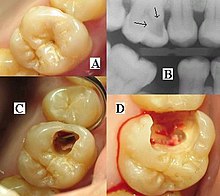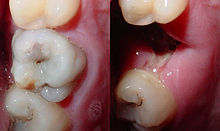Health Tip - Tooth Decay
What is Tooth Decay?
Tooth Decay (Dental caries) is an active process of tooth destruction resulting from interactions between teeth, food, and bacteria.
A tooth has an outer layer (enamel), a middle layer (dentin), and a center (pulp).
Decay begins when bacteria in your mouth increases during the first 20 to 30 minutes after you eat, bacteria make acids, which eat away at the hard mineral layers of the tooth.
Tooth Decay is the result of acids in your mouth dissolving the outer layer of your teeth.
Bacteria, is transmitted through contact and adhere to tooth surfaces in a sticky film, called dental plaque.
Tooth decay is dangerous
The bacterial infection can spread through the tissue spaces and blood vessels to other parts of the face and body and cause health complications.

What Causes Tooth Decay?
A combination of bacteria and food causes tooth decay.
A specific bacterial species "Streptococcus Mutans" is the main bacterial cause.
A specific bacterial species "Streptococcus Mutans" is the main bacterial cause.

What are Symptoms of Tooth Decay?
- Toothache;
- Bad breath - foul taste in the mouth, rotten teeth can cause bad breath like anything that is rotting, will give off a foul odor;
- White, gray, brown, or black spots on the teeth;
- Loose fillings;
- A broken tooth or a tooth that is sensitive to pressure;
- Carious lesion;
- Appearance of a chalky white spot on the surface of the tooth;
- Sensitivity of the tooth.
Side Effects of Tooth decay "Bad Teeth"?
- Blood Poisoning - the rot from the teeth gets deposited into the mouth and swallowed along with saliva, the poisonous element from the teeth get mixed into your digestive system and blood stream causing poisoning;
- Gum Disease - caused when he teeth start rotting at the root
- Headaches - pain radiates up the jaw to the ear and into the scalp causing what feels like a severe headache;
- Lack of energy - lack of confidence, no excitement about life;
- Throat infections - bacteria thriving in the mouth can lead to sore throats and other throat infections;
- Stomach problems - heart burn or indigestion, bacteria entering the stomach from decayed teeth can create problems;
- Trembling hands or fingers - rotten teeth can cause the immune system to weaken over time;
- Proper chewing and jaw aliognment
- Facial structure - shifting of the teeth
- Heart disease - bacteria can get to the heart through the blood stream, causing an open doorway for bacteria to invade the inner body.
How is Tooth Decay Diagnosed?
- Examination of all visible tooth surfaces
- X-rays of your teeth and mouth
How is Tooth Decay Treated?
- Brushing and flossing with fluoride toothpaste and/or receiving fluoride treatments;
- Filling - a material that plugs the cavity hole and restores a tooth to its original shape;
- Crown (cap) - a man-made replacement for all or part of the tooth;
- Root canal - removes the diseased pulp of a tooth and fills the pulp cavity;
- Extraction - tooth taken out and replaced with a bridge or an implant;
Home Treatments?
- Icepack on the outside of your cheek, No heat
- Take an over-the-counter pain reliever:
- Aspirin
- Acetaminophen - Tylenol
- Ibuprofen - Advil or Motrin
- Naproxen - Aleve or Naprosyn
A Healthy Mouth
How to Prevent Tooth Decay and Maintain a Healthy Teeth & Gums ?
See a dentist once or twice a year.
See a dentist once or twice a year.
- Brush and floss teeth daily;
- Mouthwash helps prevent against tooth decay;
- Clean your tongue ( helps remove bacteria);
- Rinse with hydrogen peroxide (helps reduce bacteria);
- Increase fruits and vegetables;
- Limit sugary & sticky foods.
Remember!
Rotten or decayed teeth just look bad. Decayed teeth often have holes and can turn black, left unattended can cause infection, pus to form around the gums, and often times bad breath and/or a bad taste in your mouth.
Developing and practicing good oral hygiene and eating habits you can prevent or reduce tooth decay.
Information is Power Use It!
For more information go to www.WedMD.com, www.Ask.com, www.wikipedia.org, www.colgate.com, www.answers.yahoo.com, www.ehow.com, www.wayzatadental.info, www.emedicinehealth.com, or www.dental-health-index.com.
Live well
Doc V







No comments:
Post a Comment